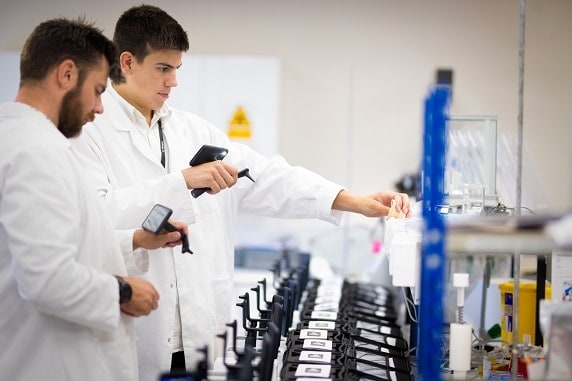Chemistry is an essential branch of science like biology.
It helps in understanding the principles of nature and also enables us to live a better life. Its contributions to man are like
- In food production
- Clothing
- Home construction
- Automobiles
- Health
- Technology
- Sanitation and cleaning
- Agriculture
- Environment
- In industry
Importance of chemistry in detail
In Food
- Chemistry defines the food we consume as carbohydrates, proteins, and fats.
- It helps us identify the essential fatty acids and amino acids that are needed by the body.
- Food process like the fermentation of molasses to obtain alcohol, baking can be studied with the help of chemistry.
- By chemistry, we can identify the nature of colors, flavors, and sweeteners added to food.
- Due to chemical modifications, we can make a sweetener that is devoid of carbohydrates for the sake of diabetics.

Many packed foods available in the market are preserved by using preservatives approved for consumption.
For Clothing
- Before the development of science and technology, humans relied on cotton, wool, and silk for the production of cloth.
- But due to the knowledge of chemistry, clothing made of polyesters is available.
- Besides, many colors and dyes are also used for designing clothes.
- Their chemical properties are also studied by chemistry.
- This helps to choose those colors or dyes which are biodegradable and not harmful to the body.
Home material
- In the past, homes were built with plain wood, rock, clay, and also mortar.
- Lime was used only for white painting of walls and surfaces.
- But due to chemical technology, humans started making cement, concrete, and even paints, varnished, tiles, etc.
- These materials give hardness, reliability, and an attractive look to homes and other constructions.
- Further, they are dustproof and waterproof.
- For example, cement is composed of calcium oxide, aluminum oxide, silicon dioxide, ferrous oxide, etc.
Automobiles
- The automobile we use daily like cars, airplanes also use some chemical knowledge in their technology.
- The fuels used, engine oils, the acid in the batteries all are linked to chemistry.
- There is intense research going on in chemistry departments in many famous universities worldwide in exploring hydrogen fuel technology.
- Besides, we use aluminum in airplane manufacturing instead of iron as it is of less weight and also highly resistant to corrosion.
Health
- Chemistry plays a vital role in health care. Its knowledge is employed in disease diagnosis, drug manufacturing, and also sterilization procedures.
- There are separate branches of chemistry that are regularly used in the field of medicine like medicinal chemistry, analytical chemistry, inorganic chemistry, organic chemistry, and biochemistry.
For more details, see the role of chemistry in medicine.
Electronic Technology
- The technology gadgets like computers, cell phones, etc. employ chemistry principles for power storage (battery), metal alloys, soldering, cleaning, scratch resistance, etc.
Sanitation and cleaning
- Cleaning of homes and offices is done on a routine basis.
- This involves heavy use of phenols, alcohols, acids, etc.
- These chemicals are not blindly employed for the purpose.
- They are preferred based on the chemical mechanisms involved in cleaning.
- A marker stain can be removed with methanol but not with plain water.
- A strong-colored stain fixed to a glass container can be removed by washing with an oxidizing agent.
- 70% of alcohol acts as antimicrobial but not less than that.
- While higher concentrations can also damage the skin cells.
So, the chemistry of their action is taken into particular regard here.
Agriculture
- Chemistry is used extensively in agriculture to enhance the yield of crops and also sustain adverse conditions.
- Chemical knowledge is used to study the nature of the soil, its pH, mineral composition, and presence of trace elements.
- The water used for irrigation is analyzed to know its chemistry, i.e., the various salts and other compounds mixed in it.
- Since not all water is suitable for agriculture; such tests are done to check the suitability of water for irrigation.
- Insecticides and pesticides are made from organophosphorous compounds.
- They are synthesized with chemical reactions and their molecular structure is known to scientists.
- Besides, the plant hormones, enzymes, and other requirements for growth are described by chemistry.
- The core plant material is also studied for its components.
These components are explored for other benefits like in medicine, clothing, etc.
In industry
- Many industries rely on chemistry for various processes.
- Industries related to pharmacetuical, leather, paper, soaps, colors, alkalies, acids rely on chemical principles for reactions, synthesis, extractions.
- Many waste materials in the industry can be reused to make other valuables by knowledge of chemistry.
- Also, chemistry is used to check the progress of the reaction by evaluating bi-products.
Analytical chemistry is used to evaluate the quality of the finished products.
Environment
- Nature around is made of different matter like solids, liquids, and gases.
- The environment can be studied in terms of this matter.
- Aspects like pollution, global warming, gases are examined by the use of chemistry.
In different areas of science
importance of chemistry in anatomy and physiology
In the subject of anatomy and physiology, the aspects like pH in different body fluids, oxygen pressure in the arteries, acid-base ratio as explained in terms of chemistry.
In cosmetics
Cosmetics are widely prepared using a different set of chemicals like the solvents, dyes, moisturizers etc
Its fantastic research